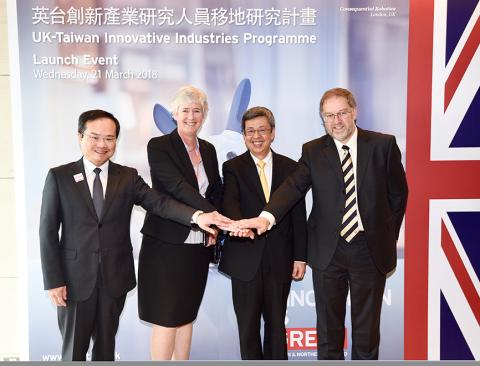A Taiwan-UK innovative industries program was launched in Taipei yesterday to improve research and development (R&D) cooperation between the two nations.
The British government is to spend £200,000 (US$281,348) in the program’s first year to bolster collaboration in key areas including biotechnology, artificial intelligence, robotics, clean energy and autonomous vehicles.
The majority of the funds is to be spent on supporting Taiwanese researchers from universities, research and technology organizations and Academia Sinica to conduct research in the UK from two weeks to 12 months, with half of the travel costs to be covered by the British government.

Photo: Peter Lo, Taipei Times
It is the first time that the British government is going to provide funding for Taiwanese researchers to conduct research in the UK.
Britain’s long tradition of excellence in science research makes it a great partner for innovation, British Foreign and Commonwealth Office Chief Scientific Adviser Robin Grimes said in his opening remarks at yesterday’s ceremony.
“We have a number of the world’s best universities. We have also been spending money on new research institutions,” Grimes said, adding that Britain is also home to the world’s second-highest number of Nobel laureates at 129.
Thanking Grimes for his support for collaboration between the two nations, Vice President Chen Chien-jen (陳建仁) said he is pleased to see how much progress the two nations have made.
Chen said the two nations are on the same page in terms of industrial strategy, as London is clear that science, research and innovation would drive the industries of the future, while Taipei has launched the “five plus two” industrial innovation program and the Forward-looking Infrastructure Development Program.
“Today’s launch is just one example of that progress and our potential for the future,” Chen said.
The deadline for applying to the program is April 30, British Office Taipei Senior Science and Innovation Officer Jasper Meyns said.
Whether a second round of applications would be accepted depends on the number of applicants in the first round, he said.

Japanese footwear brand Onitsuka Tiger today issued a public apology and said it has suspended an employee amid allegations that the staff member discriminated against a Vietnamese customer at its Taipei 101 store. Posting on the social media platform Threads yesterday, a user said that an employee at the store said that “those shoes are very expensive” when her friend, who is a migrant worker from Vietnam, asked for assistance. The employee then ignored her until she asked again, to which she replied: "We don't have a size 37." The post had amassed nearly 26,000 likes and 916 comments as of this

US President Donald Trump said "it’s up to" Chinese President Xi Jinping (習近平) what China does on Taiwan, but that he would be "very unhappy" with a change in the "status quo," the New York Times said in an interview published yesterday. Xi "considers it to be a part of China, and that’s up to him what he’s going to be doing," Trump told the newspaper on Wednesday. "But I’ve expressed to him that I would be very unhappy if he did that, and I don’t think he’ll do that," he added. "I hope he doesn’t do that." Trump made the comments in

Tourism in Kenting fell to a historic low for the second consecutive year last year, impacting hotels and other local businesses that rely on a steady stream of domestic tourists, the latest data showed. A total of 2.139 million tourists visited Kenting last year, down slightly from 2.14 million in 2024, the data showed. The number of tourists who visited the national park on the Hengchun Peninsula peaked in 2015 at 8.37 million people. That number has been below 2.2 million for two years, although there was a spike in October last year due to multiple long weekends. The occupancy rate for hotels

A cold surge advisory was today issued for 18 cities and counties across Taiwan, with temperatures of below 10°C forecast during the day and into tonight, the Central Weather Administration (CWA) said. New Taipei City, Taipei, Taoyuan and Hsinchu, Miaoli and Yilan counties are expected to experience sustained temperatures of 10°C or lower, the CWA said. Temperatures are likely to temporarily drop below 10°C in most other areas, except Taitung, Pingtung, Penghu and Lienchiang (Matsu) counties, CWA data showed. The cold weather is being caused by a strong continental cold air mass, combined with radiative cooling, a process in which heat escapes from